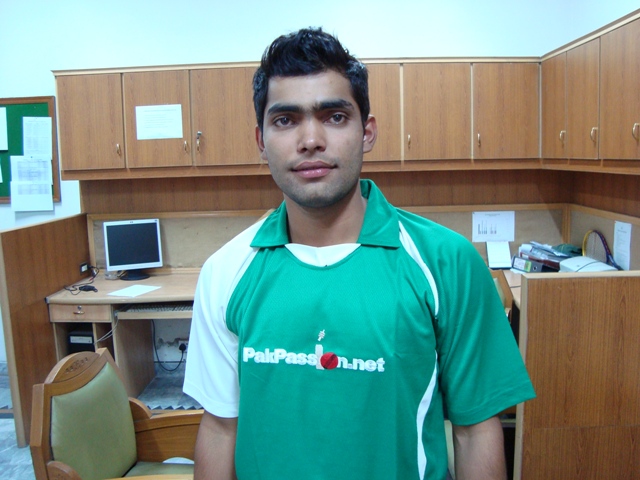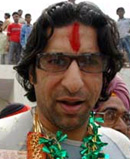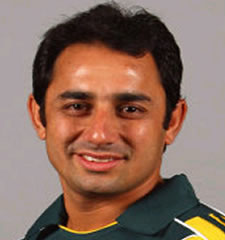Wasim Akram Biography
Wasim Akram born 3 June 1966 is a former Pakistani left arm fast bowler and left-handed batsman in cricket, who represented the Pakistan national cricket team in Test cricket and One Day International matches.
Wasim Akram is regarded as one of the best fast bowlers in cricket history. He holds the world record for most wickets in List A cricket with 881 and is second only to Sri Lankan off-spin bowler, Muttiah Muralitharan in terms of One Day International wickets with 502. He is considered to be one of the founders and perhaps the finest exponent of reverse swing bowling.
The revolutionary nature of reverse swing initially resulted in accusations of ball tampering by cricket critics, although the skill of the reverse swing delivery has now been accepted as a legitimate feature of ability in cricket. Wasim Akram's later career was also tarnished with accusations of match fixing by critics, although these remain unproven.
On 30 September 2009, Akram was one of five new members inducted into the ICC Cricket Hall of Fame.
Early and Personal Life
Akram was born in 1966, in Lahore, Pakistan.
He was educated in Islamia College in Lahore, where he played as an opening bowler and batsman. Like several other Pakistani cricketers during the 1980s, his inclusion into the national side was at the behest of a senior player in the team, which in Akram's case, was Javed Miandad.
Wasim Akram was diagnosed with diabetes at the peak of his career, but despite the initial psychological blow, he managed to regain his form and went on to produce fine cricketing performances. Since then he has actively sought to be involved in various awareness-raising campaigns for diabetes.
He was married to Huma Mufti, in 1995. They had two sons Taimur and Akbar, from their marriage of fifteen years. Huma died of multiple organ failure at Apollo Hospital in Chennai, India, on 25 October 2009.
International career
First-class cricket
In 1988 he signed for Lancashire County Cricket Club in England and went on to become their most successful overseas players. From 1988 to 1998, he opened their bowling attack in their ECB Trophy, Benson and Hedges Cup and National League tournaments. He was a favourite of the local British fans who used to sing a song called "Wasim for England" at Lancashire's matches. In 1998, with Akram as captain, Lancashire won the ECB Trophy and Axa League and finished second in the championship tournament despite losing only five matches in all competitions throughout the season. Apart from the National League second division title in 2003, this was the last time Lancashire won a trophy.
Test Cricket
Akram made his Test cricket debut for Pakistan against New Zealand in 1985 and in only his second Test match, he achieved 10 wickets in the match. A few weeks prior to his selection into the Pakistan team, he was an unknown club cricketer who had failed to even make it to his college team. He came to the trials at Gaddafi Stadium in Lahore in Pakistan, but for the first two days he did not get a chance to bowl. On the third day he got a chance; his performance convincing Javed Miandad to insist upon his inclusion in the national team. Wasim Akram was hence given an opportunity to play for Pakistan, without any significant domestic experience. Later that season he opened the bowling attack with Imran Khan, who became his mentor at and after the World Championship of Cricket in Australia.
In the 1987 Cricket World Cup, when Pakistan played against the West Indies, Akram bowled to Viv Richards in the late overs of the innings but Richards, who is regarded as the best batsman during that period, struggled against Akram's bowling performances.
Akram's rise in international cricket was rapid during the late 1980s. When Pakistan toured the West Indies in 1988, he looked to be the fastest bowler between the two sides. However, a groin injury impeded his career in the late 1980s. Following two surgeries, he re-emerged in the 1990s as a fast bowler who focused more on swing and accurate bowling.
One Day International
Wasim Akram was a significant figure in the 1992 Cricket World Cup held in Australia, when Pakistan won the tournament. In the final against England, his batting performance during his innings of 33 runs off 19 balls, pushed Pakistan to a respectable score of 249 runs for 6 wickets. Akram then took the important wicket of Ian Botham early on the English batting innings and when brought back into the bowling attack later on, with the ball reverse swinging, he produced a devastating spell of bowling which led to Allan Lamb and Chris Lewis being bowled in successive deliveries in one over. His excellent performances earned him the Man of the Match award for the final.
He also captained Pakistan with some success. The high points of his captaincy was the 1996-1997 victory in the World Series Cricket in Australia, two Test match wins in India in 1998-1999 and in 1999, when Pakistan reached the 1999 Cricket World Cup final. The low point was the 1996 Cricket World Cup in Pakistan and India, when he had to pull out of the quarter final match against India, citing injury. After Pakistan's defeat, there were angry protests outside his home and riots across the country from angry fans who accused the team of throwing the match and a government inquiry was launched into the failure.
In 1999, he led Pakistan to the brink of victory in the World Cup before they capitulated and was defeated by Australia in the final, by eight wickets with almost 30 overs to spare. This was the start of the match fixing controversies, as critics believed Wasim Akram had set up the match for Australia. However, none of the allegations could be proved.
He was Pakistan's best bowler in the 2003 Cricket World Cup taking 19 wickets in 7 matches. However, Pakistan failed to reach the "Super Six" phase of the tournament and Akram was one of the eight players to be sacked by the Pakistan Cricket Board as a result.
Retirement
On May 18, 2003, at the age of 36, Akram abruptly announced his retirement from international cricket, ending a career which spanned 19 years. He had suggested that he was ready to quit several times towards the end of his career, but Pakistan's sub-par performance in the World Cup proved to be the deciding factor.
Prior to his retirement, he was one of eight senior players dropped for the Sharjah Cup in April 2003, and was then omitted from the Pakistan squad for the subsequent Bank Alfalah Cup triangular series. Due to his omission from the team, he did not participate in a farewell match.
Wasim Akram fulfilled his contract play for Hampshire until the end of the English season.
Post Retirement
Media Career
Since retiring from cricket, Akram has worked and taken up commentary for television networks and can currently be seen as a sports commentator for ESPN Star Sports, ARY Digital and among others. He did commentary on a variety of sporting tournaments including the 2009 Women's Cricket World Cup match between Australia v India in a Super Six Match held in Australia, the 2009 ICC World Twenty20 in England, the 2009 ICC Champions Trophy in South Africa and among others.
Coaching Career
In 2010, Akram was appointed the bowling coach consultant of Kolkata Knight Riders, the Indian Premier League team for Kolkata. Sourav Ganguly was always keen to have Akram as the bowling coach for India, during the former's stint as Indian captain. Although this never happened, his dreams were realised to some extent, when Akram was appointed as the bowling coach for the franchise. While working for the Kolkata Knight Riders, he was also responsible for the signing of Pakistani domestic left-arm fast-bowler Mohammad Irfan. Akram has also been coaching in Pakistan fast bowling camps; his most notable discovery being the teenage Pakistani international, Mohammad Aamer.
Wasim Akram’s Skills in Cricket
During his professional career he bowled with genuine speed and hostility. Akram was a man possessed of accurate control of line and length, accompanied by seam and swing bowling skills, extended to both inswingers and outswingers. With a very quick bowling action, he could bowl equally well from both sides of the wicket. His mastery of reverse swing with the cricket ball meant he was at his most dangerous towards a bowling innings, and earned him the nickname of the "Sultan of Swing".
As well as often being able to find the edge of the bat, Akram would also focus his bowling attack on the stumps and had a particularly lethal inswinging yorker. Of his 414 Test wickets, 193 were taken caught, 119 were taken leg before wicket and 102 were bowled. In partnership with Waqar Younis, he intimidated international batsmen in the 1990s. Together Wasim and Waqar, known as "the two Ws" of the Pakistani team, were one of the most successful bowling partnerships in cricket.
Wasim Akram was also skilled with the bat and was regarded as a bowling all-rounder. He was especially effective against spin bowlers. However, he liked to slog and was criticised for his lack of high scores and giving away his wicket too cheaply for a player of his talent. He did silence his critics and the media in October 1996 when he scored 257 runs not out, of the team's total of 553 against Zimbabwe at Sheikhupura. He also achieved good scores for the Pakistan team such as his scores of 123 and 45* against Australia to take Pakistan to victory in a low scoring match. His batting was also valuable to the Pakistan ODI side, such as his match winning performance in the Nehru Cup, when needing six runs and two balls to win the match; he hit the first delivery he faced for six runs and secured the cup.
Award and Records
Akram was awarded Wisden Cricketer of the Year in 1993 for his sporting achievements.
In his Test career, Akram took 414 wickets in 104 matches, a Pakistani record, at an average of 23.62 and scored 2,898 runs, at an average of 22.64.
In One Day Internationals, Akram took 502 wickets in 356 appearances, at an average of 23.52 and scored 3,717 runs, at an average of 16.52.
Akram was the first bowler in international cricket to take more than 400 wickets in both forms of the game and only Muttiah Muralitharan has since achieved this.
Akram also held the record for the most wickets in Cricket World Cups, a total of 55 in 38 matches. Australia's Glenn McGrath broke the record during the 2007 Cricket World Cup, ending with a final tally of 71 from 39 matches. On passing Wasim's record, McGrath said, "Wasim Akram, to me, is one of the greatest bowlers of all time. Left-armer, swung it both ways with the new ball and he was so dangerous with the old ball. To go past him is something I will always remember. Probably the other side of the coin is that if you play long enough, you're going to break records here and there."
Akram took four hat-tricks in international cricket, two each in Tests matches and One Day Internationals. He is the only bowler in cricket to have achieved four hat-tricks. He is also one of only three bowlers to have taken two Test cricket hat-tricks, the others being Hugh Trumble and Jimmy Matthews. Akram is also one of only three bowlers to have taken two One Day International cricket hat-tricks, the others being Pakistan offspin bowler, Saqlain Mushtaq and Sri Lankan fast bowler Chaminda Vaas. Akram's Test hat-tricks are significant, since they were taken in consecutive Test matches in the same series, a game played against Sri Lanka in the 1998-99 Asian Test Championship. Akram is also one of only two bowlers to have taken both a Test match and One Day International hat-trick, the other being Pakistan fast bowler, Mohammad Sami.
Playing in a Test series against the West Indies at Lahore in 1990-1991, he became one of only six players to have taken four wickets in an over during a Test match. In Akram's case, these achievement was not part of a hat-trick, the third ball he delivered to the batting opposition was a dropped catch, which allowed a single run.
Akram has also achieved the highest score by a number eight batsman in Test cricket when he scored 257 runs not out from 363 balls against Zimbabwe at Sheikhupura. The innings contained 12 sixes which is also a world record for Test cricket.
He also has the third highest number of Man of the Match awards in Test cricket, with seventeen.
He has scored the record number of runs in One Day International matches by a player who has never scored a One Day International hundred. His highest score was 86 runs.
Wasim Akram
Wasim Akram
Wasim Akram
Wasim Akram
Wasim Akram
Wasim Akram
Wasim Akram
Wasim Akram
Wasim Akram
Wasim Akram- The King Of Swing !!































































